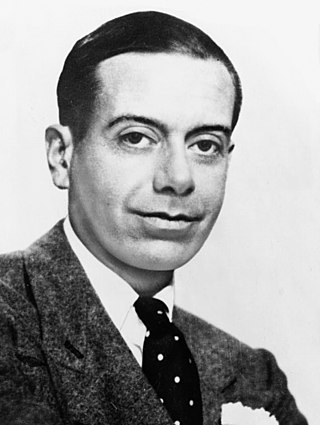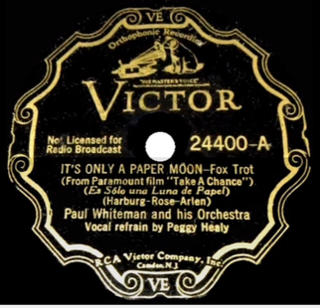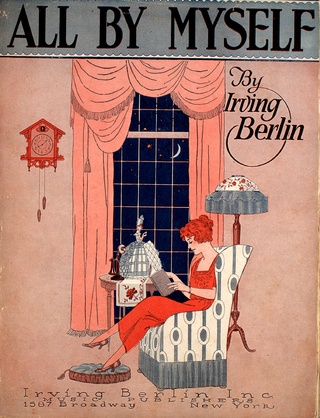"What Is This Thing Called Love?" is a 1929 popular song written by Cole Porter, for the musical Wake Up and Dream. It was first performed by Elsie Carlisle in March 1929. The song has become a popular jazz standard and one of Porter's most often played compositions.
"Around the World" is the theme tune from the 1956 movie Around the World in 80 Days. In the film, only an instrumental version of the song appeared, although the vocal version has become the better known one. The song was written by Harold Adamson and Victor Young; Young died in 1956, several weeks after the film's release, and he received the Academy Award for Best Music, Scoring of a Dramatic or Comedy Picture posthumously. Young's orchestral version was a #13 hit on the Billboard charts in 1957. The recording by Bing Crosby was the B-side of the Victor Young version in 1957, on Festival SP45-1274 in Australia, and was a joint charting success.
"Baubles, Bangles, & Beads" is a popular song from the 1953 musical Kismet, credited to Robert Wright and George Forrest.

"Night and Day" is a popular song by Cole Porter that was written for the 1932 musical Gay Divorce. It is perhaps Porter's most popular contribution to the Great American Songbook and has been recorded by dozens of musicians. NPR says "within three months of the show's opening, more than 30 artists had recorded the song."

"Let's Do It, Let's Fall in Love" (also known as "Let's Do It (Let's Fall in Love)" or simply "Let's Do It") is a popular song written in 1928 by Cole Porter. It was introduced in Porter's first Broadway success, the musical Paris (1928) by French chanteuse Irène Bordoni for whom Porter had written the musical as a starring vehicle.
"So in Love" is a popular song, written by Cole Porter, from his musical Kiss Me, Kate, which was based on Shakespeare's The Taming of the Shrew. It was sung in the show by Patricia Morison, reprised by Alfred Drake, and further popularized by Patti Page in 1949.
"On the Sunny Side of the Street" is a 1930 song composed by Jimmy McHugh with lyrics by Dorothy Fields. Some authors say that Fats Waller was the composer, but he sold the rights to the song. It was introduced in the Broadway musical Lew Leslie's International Revue starring Harry Richman and Gertrude Lawrence.
"P.S. I Love You" is a popular song with music by Gordon Jenkins and lyrics by Johnny Mercer. published in 1934.
"Too Marvelous for Words" is a popular song written in 1937. Johnny Mercer wrote the lyrics for music composed by Richard Whiting. It was introduced by Wini Shaw and Ross Alexander in the 1937 Warner Brothers film Ready, Willing, and Able, as well as used for a production number in a musical revue on Broadway. The song has become a pop and jazz standard and has been recorded by many artists.

"It's Only a Paper Moon" is a popular song published in 1933 with music by Harold Arlen and lyrics by Yip Harburg and Billy Rose.
"Please Don't Talk About Me When I'm Gone" is a song published in 1930. It was written by Sam H. Stept with lyrics by Sidney Clare. The original publication also credited singer Bee Palmer as co-composer.
"Just One of Those Things" is a popular song written by Cole Porter for the 1935 musical Jubilee.
"I Love Paris" is a popular song written by Cole Porter and published in 1953. The song was introduced by Lilo in the role of La Mome in the musical Can-Can. A line in the song's lyrics inspired the title of the 1964 movie Paris When It Sizzles.
"I've Got a Crush on You" is a song composed by George Gershwin, with lyrics by Ira Gershwin. It is unique among Gershwin compositions in that it was used for two different Broadway productions: Treasure Girl (1928), when it was introduced by Clifton Webb and Mary Hay, and Strike Up the Band (1930), when it was sung by Doris Carson and Gordon Smith. It was later included in the tribute musical Nice Work If You Can Get It (2012), in which it was sung by Jennifer Laura Thompson. When covered by Frank Sinatra he was a part of Columbia Records.
"It's All Right with Me" is a popular song written by Cole Porter, for his 1953 musical Can-Can, where it was introduced by Peter Cookson as the character Judge Aristide Forestier.
"I Am in Love" is a 1953 popular song written by Cole Porter, for his musical Can-Can, where it was introduced by Peter Cookson.
"(You'd Be So) Easy to Love" is a popular song written by Cole Porter for William Gaxton to sing in the 1934 Broadway show Anything Goes. However Gaxton was unhappy about its wide vocal range and it was cut from the musical. Porter re-wrote it for the 1936 film Born to Dance, where it was introduced by Eleanor Powell, James Stewart, and Frances Langford under its alternate title, "Easy to Love". The song was later added to the 1987 and 2011 revivals of Anything Goes under the complete title "You’d Be So Easy to Love".

"All by Myself" is a popular song written by Irving Berlin, published in 1921.

"Swingin' Down the Lane" is a 1923 song composed by Isham Jones with lyrics by Gus Kahn. Jones' instrumental version was second to "March of the Wooden Soldiers" in the list of top songs for 1923. Other popular versions in 1923 were by Ben Bernie, and The Columbians.
I See Your Face Before Me is a popular song composed by Arthur Schwartz, with lyrics by Howard Dietz. It was introduced by Evelyn Laye and Adele Dixon in the 1937 Broadway musical Between the Devil. Two recordings of the song made the charts shortly after the show's debut: Guy Lombardo & His Royal Canadians reached number 12, and Glen Gray & The Casa Loma Orchestra made it to number 13.




